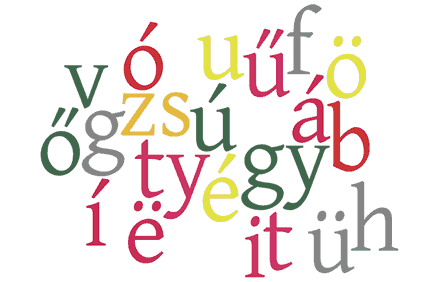Learn Hungarian
| English | Hungarian | |||
|---|---|---|---|---|
| Hello | Helló! | |||
| Hello | Jónapot! | |||
| Good evening | Jóestét! | |||
| Goodbye | Viszlát! | |||
| Goodbye | Viszontlátásra! | |||
| See you later | Később találkozunk | |||
| See you later | Akkor később találkozunk | |||
| Yes | Igen | |||
| No | Nem | |||
| Excuse me! | Elnézést | |||
| Thanks | Köszönöm | |||
| Thanks | Köszi | |||
| Thanks a lot | Köszönöm szépen! | |||
| Thanks a lot | Nagyon köszönöm! | |||
| Thank you for your help | Köszönöm a segítségét! | |||
| You’re welcome | Szívesen | |||
| Okay | Jó - Jól van – Oké | |||
| Okay | Rendben (van) | |||
| How much is it? | Elnézést, ez mennyibe kerül? | |||
| Sorry! | Bocsánat! | |||
| Sorry! | Bocsánatot kérek! | |||
| I don't understand | Nem értem | |||
| I get it | Értem | |||
| I don't know | Nem tudom | |||
| Forbidden | Tilos | |||
| Excuse me, where are the toilets? | Elnézést, hol van a WC? | |||
| Excuse me, where are the toilets? | Elnézést, hol van a mosdó? | |||
| Happy New Year! | B.ú.é.k! | |||
| Happy New Year! | Boldog új évet kívánok! | |||
| Happy Birthday! | Boldog születésnapot! | |||
| Happy Birthday! | Boldog szülinapot! | |||
| Happy Holidays! | Kellemes Ünnepeket! | |||
| Congratulations! | Gratulálok! | |||
| Congratulations! | Gratulálunk! |
Objectives Do you want to learn Hungarian to communicate more easily in everyday situations in Hungary? Loecsen offers a structured Hungarian course for beginners, designed to reach the skills expected at the CEFR A1 level. Words and sentences are chosen to match real situations, following a clear pedagogical progression. Learning relies on complete sentences, grammar explained through usage, precise pronunciation work, and modern tools to support memorization. With 5 to 15 minutes of practice per day, you can reach your first A1 language goal and gain autonomy from your very first exchanges in Hungarian.
How to Learn Hungarian by Yourself? Start with an Easy and Free Online Course!
We have adopted an objective and efficient approach to learn how to speak a language easily and quickly. We suggest you start by memorizing words, phrases, and practical expressions that you can use in everyday life and that will be useful when traveling.
Getting used to pronouncing words out loud, such as numbers, is an easy exercise you can often practice and at any time throughout the day.
This practice will help you get accustomed to the sounds of your chosen language, making it more familiar.
Once your holidays have begun, whether in Budapest, the picturesque Szentendre, or elsewhere, you will be surprised at how familiar and easy to understand it will seem.
Furthermore, using a pocket dictionary is always useful, particularly during a trip. It allows you to find the translation of new words and enrich your vocabulary.
Why Speak Hungarian While Traveling?
Do you know what the ballpoint pen and the Rubik's Cube have in common? Both are inventions born of Hungarian creativity!
Well-developed in the field of research, Hungary has several universities, schools, and laboratories from which iconic global figures of science have emerged, such as economist John Harsanyi and chemist George de Hevesy, both Nobel Prize laureates. Even if research isn't your field, you can savor the ironic and suggestive style of Imre Kertész - winner of the Nobel Prize for Literature in 2002 - or discover the work of Georg Lukács in its original form. All good reasons to dive into learning Magyar and discover the subtleties of this agglutinative and harmonic language of the Finno-Ugric branch!
Good Deals on the Horizon
As a mid-ranked power of the European Union, Hungary is a Central European country with a population of around 10 million inhabitants. It also has a vast Magyar population of almost 2.5 million Hungarian minorities in neighboring nations and significant emigrant communities in Canada, the United States, Australia, and Israel. As one of the official languages of the European Union, knowledge of Hungarian could be a real asset if you plan to apply for work in EU institutions.
Make a Success of Your Stay in Hungary
Whether you are going to spend a few days with friends on a leisure trip or if you are on a business trip, nothing will be more useful than being able to slip in a few words in the language of your interlocutors. They will appreciate your effort and be more willing to help.
How to Succeed in Having Good Pronunciation Within a Week to a Month?
Hungarian, a Difficult Language?
It is true that Hungarian has a reputation for being difficult to learn, but the originality of its linguistic mix is worth the effort.
By learning the vocabulary with its mix of Slavic, Latin, German, Turkish, and Indo-Iranian origins, you'll notice the seven pairs of long and short vowels as well as the 44 letters of its alphabet.
An Enlarged Latin Alphabet
Written in the Latin alphabet, Hungarian comprises 44 letters, including seven pairs of vowels and 25 consonants, all of which can be long or short, with phonemic stress giving meaning.
The Hungarian accent is always stressed on the first syllable of words. Notably, double letters or vowels that follow each other are pronounced separately, and certain double letters like Cs, Sz, and Ty are indivisible. For instance, the letter ZS is pronounced like the French "JEU," and the letter J is pronounced like the English "YES".
We invite you to listen to the pronunciation of the letters by clicking on the following link: Hungarian alphabet with audio.
Practical Tips for Learning Hungarian
1. Start with the Basics
Begin by learning the Hungarian alphabet and basic pronunciation rules. This foundation will help you read and speak Hungarian more accurately.
2. Build Your Vocabulary
Focus on everyday words and phrases that you are likely to use. Flashcards and language apps can be very helpful in expanding your vocabulary.
3. Practice Speaking
Speak Hungarian as much as possible. Practice with native speakers or fellow learners. Use language exchange platforms to find conversation partners.
4. Immerse Yourself
Immerse yourself in the language through Hungarian media. Watch Hungarian movies, listen to Hungarian music, and follow Hungarian news. This will help improve your listening skills and familiarize you with the cultural context.
5. Use Official Online Resources
Here is an online resources to help you learn Hungarian:
- Hungary - Official Website: Provides resources for learning about Hungarian culture and language.
6. Take a Language Course
Consider enrolling in a language course with a qualified teacher. Personalized instruction can accelerate your learning and help you master difficult concepts.
7. Stay Consistent
Consistency is key. Practice Hungarian daily, even if only for a few minutes. Regular exposure and practice will lead to steady progress.
By following these steps and utilizing the available resources, you can start speaking and understanding Hungarian in no time. Happy learning!






